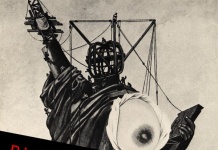Nick Mamatas kindly referenced this interesting post by Internet poet Steve Roggenbuck – whose personal style and deliberate spelling errors and lower case proper nouns on his “Live My Lief” blog, you have to take with a pinch of salt. Because what he does say actually makes a lot of sense in the context of current critiques of the MFA approach to fostering creative writing that I’ve covered recently – and that other people seem to be adding to all the time. So I hope he doesn’t mind me rectifying his spelling and capitalization in places.
“In September 2010 i started the poetry MFA program at Columbia College Chicago,” Steve explains. “I had a mixed but mostly negative experience, and I dropped out in November 2011.” And, as he continues, the Master in Fine Arts discipline is not uniformly welcomed in the literary community, and indeed, some “think MFAs are actually ruining poetry. it’s a pretty loaded subject. i don’t side with either extreme in the debate, but my MFA was pretty bad for me, and i want to tell that story.”
 Roggenbuck then recounts his experiences with three separate professors, all of them unreceptive to his work to varying degrees and for varying reasons. Without going into too much detail on the more literary differences of opinion – which are all in the post anyway – you can get the gist from the reaction of the third professor to one of his verses: “as someone who doesn’t really use the internet or texting, what does this poem do for ME?”
Roggenbuck then recounts his experiences with three separate professors, all of them unreceptive to his work to varying degrees and for varying reasons. Without going into too much detail on the more literary differences of opinion – which are all in the post anyway – you can get the gist from the reaction of the third professor to one of his verses: “as someone who doesn’t really use the internet or texting, what does this poem do for ME?”
He summarizes his issues with the whole process in “my #1 main problem with my MFA experience”: “If I followed their advice, I would’ve written poems they love, suited for publication by journals and presses they love—but I want to write poems I love, and which myyy people love … when you try to please people outside your ideal audience, you often end up ruining aspects of your work that really make it outstanding to its right audience.” And his #2 main problem? “I didn’t have enough independence to pursue my own vision, choose what to study, etc. … I wanted to take a typography class as part of my MFA so I could make better visual poems, but my poetry program made me get permission from two different authority figures to enroll in the class.” But his #3 main problem might worry many potential MFAs more. “I have $33,000 in student debt now (I had none before the MFA), and I didn’t even finish my program.”
I don’t know the funding and grants procedures around MFA programs in the U.S. well enough to know if that debt actually goes towards paying the stipends of the three professors who did such good work in supporting Roggenbuck in his vision … but I wouldn’t be surprised. And, he states, “if your goal is to become a better poet then it’s pretty obvious you don’t need an MFA for that.” So what is that $33,000 going on?
Arguably, that kind of money will add up to quite a lot across the entire U.S. – and potentially it could be better spent on other uses more beneficial to the creation of good writing. Presumably, it’s too much to expect that MFA professors in well-tenured positions will fall on their swords for the greater good of literature. And probably there are some very worthwhile and productive MFA courses around – even if the CIA isn’t bankrolling them any more. Now will someone kindly point me at them?

































